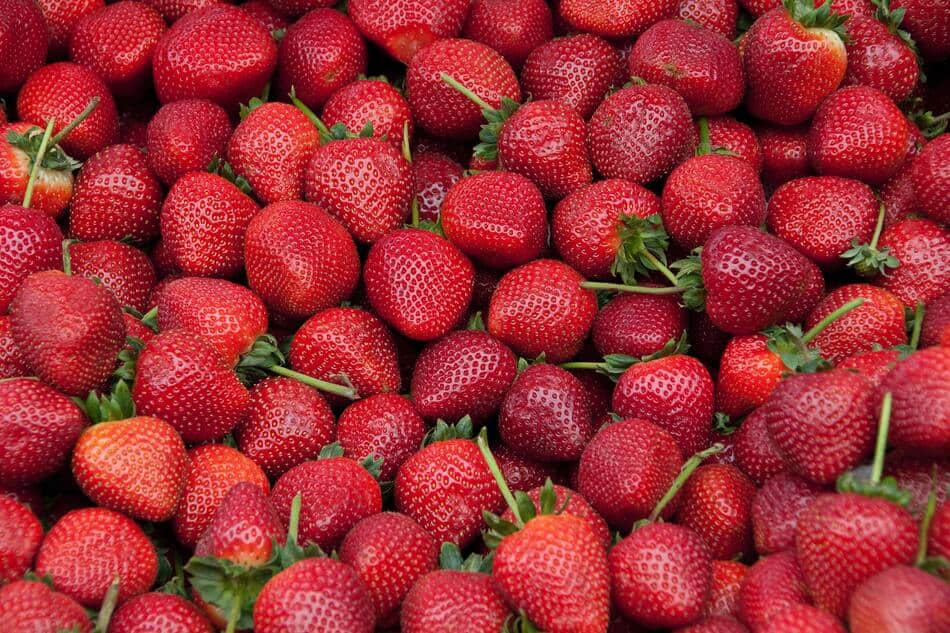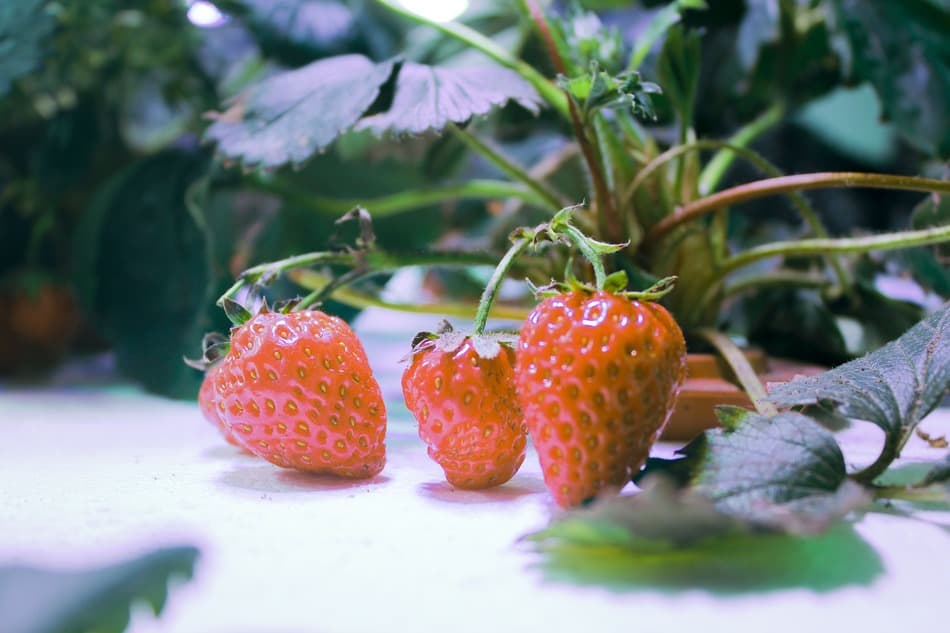When it comes to organic produce, many people think of fruits and vegetables that are grown in the ground. But what about produce that is grown in water? Is hydroponic produce considered organic? In this article, I’ll take a closer look at hydroponic strawberries and explore whether or not they are considered organic. I’ll also discuss some of the benefits and drawbacks of growing strawberries in this way. So if you’re interested in learning more about organic hydroponic strawberries, keep reading!
Hydroponic strawberries are not organic. Organic farming prohibits the use of synthetic pesticides, herbicides, and fertilizers. Hydroponic strawberry farmers must use these products to grow their fruit.
What Are Hydroponic Strawberries?
Hydroponic strawberries are grown without soil, using mineral-rich water and a growing medium instead. The hydroponic method is often used in commercial strawberry production because it can produce larger, healthier fruits than those grown in soil.
Also Read: How To Keep pH Stable In Hydroponics?
Are hydroponic strawberries organic? For a food to be certified organic, it must be grown without the use of synthetic pesticides, herbicides, or fertilizers. Hydroponic strawberries can be organic if they are grown without the use of these chemicals. However, many commercial hydroponic strawberry growers do use synthetic chemicals, so it is important to check with the grower before purchasing organic strawberries to make sure they are truly chemical-free.
What Is The Difference Between Hydroponics And Organic Strawberries?
Hydroponic strawberries are grown without soil, using a nutrient-rich water solution. Organic strawberries are grown in soil that has been certified by the United States Department of Agriculture (USDA) as being free of synthetic pesticides and fertilizers.

The main difference between hydroponic and organic strawberries is how they are grown. Hydroponic strawberries are grown without soil, using a nutrient-rich water solution. Organic strawberries are grown in soil that has been certified by the USDA as being free of synthetic pesticides and fertilizers.
Are Hydroponic Strawberries Organic?
The answer is a little complicated. Technically, hydroponic strawberries are grown without soil, so they can’t be certified as organic by the USDA. However, many hydroponic farmers use organic growing methods and inputs, so their strawberries may be just as organic as those grown in soil. It depends on the individual farm and how they grow their strawberries.
Relevant Article: How To Start A Hydroponic Farm?
So, there you have it! Hydroponic strawberries can be just as organic as those grown in soil, depending on the farm and growing methods used. If you’re looking for truly organic strawberries, your best bet is to buy them from a certified organic farm.
How To Grow Hydroponic Strawberries?
You can grow hydroponic strawberries using either a soilless medium or water. Hydroponic strawberries are grown in an inert medium, such as perlite, that is irrigated with a nutrient solution. The advantage of growing hydroponic strawberries is that you can control the environment, which results in larger and healthier fruits.
Benefits Of Growing Hydroponic Strawberries
1. Hydroponic strawberries can be grown year-round, regardless of climate.
2. They require less water and land than traditional agriculture.
3. Pest and disease pressure are lower in a controlled hydroponic environment.
4. Nutrient availability can be precisely managed, leading to healthier plants and higher yields.
Organic Certification For Hydroponic Strawberries
1. To be certified organic, a hydroponic strawberry operation must adhere to the same standards as any other organic farm.
2. This includes using only approved inputs, maintaining strict records, and being inspected by a certifying agency.
3. While some argue that hydroponic systems are inherently more sustainable than traditional agriculture, this is not currently reflected in the organic standards.
4. As the organic industry continues to evolve, hydroponic strawberry growers may be able to obtain certified organic status in the future.
Drawbacks Of Growing Hydroponic Strawberries
1. Pests and diseases: Hydroponic strawberries are especially susceptible to pests and diseases because they are grown in a controlled environment.
2. Nutrient deficiencies: Without the right mix of nutrients, hydroponic strawberries will not be as healthy or productive as they could be.
3. High costs: Setting up and maintaining a hydroponic strawberry operation can be expensive.
4. Limited variety: There are only a handful of hydroponic strawberry varieties available commercially.
Despite these drawbacks, hydroponic strawberries can be a viable option for growers who are looking to produce a high-quality product. With the right knowledge and management, hydroponic strawberry growers can overcome these challenges and be successful.
Tips For Growing Hydroponic Strawberries

1. Choose the right strawberry variety for hydroponics. Some varieties are better suited to hydroponic growing than others.
2. Make sure your hydroponic system is well-suited to strawberry plants. Their roots need plenty of oxygen, so a bubbling system is a good option.
3. Use organic nutrients. While chemical fertilizers will work in a hydroponic system, they can build up over time and become harmful to the plants. Using organic nutrients will help avoid this problem.
4. Keep an eye on the pH of your nutrient solution. Strawberry plants prefer a slightly acidic environment, so you may need to adjust the pH of your system accordingly.
5. Keep your strawberry plants well-watered. They will need more water than plants grown in soil, so make sure to check the moisture level of your system regularly.
With these tips, you can grow delicious and healthy hydroponic strawberries that are also organic!
Also Read: How To Germinate Seeds For Hydroponics?
Why Are Hydroponic Strawberries More Expensive Than Regular Strawberries?
The main reason that hydroponic strawberries are more expensive than regular strawberries is that they require a lot more attention and care. Hydroponic strawberries are grown in a controlled environment, often indoors, which means that they need to be monitored constantly to make sure that the conditions are perfect for them to grow. This extra level of care can add to the overall cost of hydroponic strawberries. Additionally, hydroponic strawberries often have a shorter shelf life than regular strawberries since they are more delicate and need to be eaten sooner after being picked.
Conclusion
Hydroponic strawberries are not organic. The soil in which the plants grow is not exposed to pesticides, herbicides, or other chemicals, and the water used in the hydroponic system is also chemical-free. However, because they are not grown in soil, hydroponic strawberries are not considered organic. If you’re looking for organically-grown strawberries, look for those that have been certified by an accredited organization like USDA Organic or Certified Naturally Grown.

